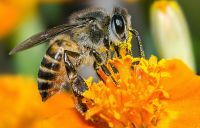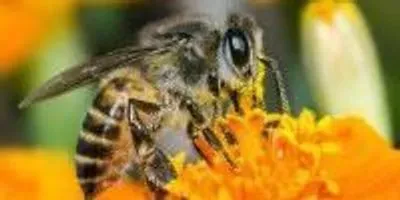 The research compared pathogen growth in honey bees that were infected with both the exotic parasite, Nosema ceranae and its original native relative, Nosema apis.Queen’s University Belfast The gut parasite Nosema ceranae – which originates in Asia but can now be found worldwide – is likely to cause increasing damage to UK bees as the Earth heats up through climate change.
The research compared pathogen growth in honey bees that were infected with both the exotic parasite, Nosema ceranae and its original native relative, Nosema apis.Queen’s University Belfast The gut parasite Nosema ceranae – which originates in Asia but can now be found worldwide – is likely to cause increasing damage to UK bees as the Earth heats up through climate change.
The new finding that this parasite not only has a superior competitive ability, but that its numbers could rise with climate change, has been published in the journal Proceedings of the Royal Society B.
Co-author of the study and Adjunct Reader at Queen’s School of Biological Sciences, Professor Robert Paxton said: “This emerging parasite is more susceptible to cold than its original close relative, possibly reflecting its presumed origin in east Asia. In the face of rising global temperatures, our findings suggest that it will increase in prevalence and potentially lead to increased honey bee colony losses in Britain.”
Co-researcher Myrsini Natsopoulou, from the Martin-Luther-Universität Halle-Wittenberg in Germany said: “Our results reveal not only that the exotic parasite is a better competitor than its original close relative, but that its widespread distribution and patterns of prevalence in nature depend on climatic conditions too”.
The research compared pathogen growth in honey bees that were infected with both the exotic parasite, Nosema ceranae and its original native relative, Nosema apis.
Experiments showed that, while both parasites inhibit each other’s growth, the exotic Nosema ceranae has a much greater negative impact on the native Nosema apis than vice versa. By integrating the effects of competition and climate into a simple mathematical model, the researchers were better able to predict the relative occurrence of both parasite species in nature:Nosema ceranae is common in Southern Europe but rare in Northern Europe.
This study was funded by the Insect Pollinators Initiative, a joint venture of the UK’s Biotechnology and Biological Sciences Research Council (BBSRC), Defra, the Natural Environment Research Council (NERC), the Scottish Government and the Wellcome Trust, managed under the auspices of the Living with Environmental Change (LWEC) partnership.
The full paper can be read at: http://rspb.royalsocietypublishing.org/ Natsopoulou ME, McMahon DP, Doublet V, Bryden J, Paxton RJ. (2015) Interspecific competition in honey bee intracellular gut parasites is asymmetric and favours the spread of an emerging infectious disease. Proceedings of the Royal Society B: Biological Sciences. 20141896. http://dx.doi.org/10.1098/rspb.2014.1896














